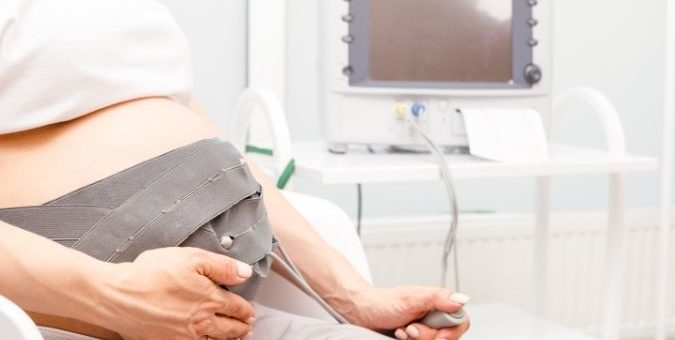
Gestational diabetes is a type of diabetes which develops specifically during pregnancy and usually goes away after your baby is born. It is caused by the hormones you produce in pregnancy stopping your body from using insulin properly.
When this happens, your body struggles to use the sugar (glucose) in your body for energy, so it just stays in your blood. According to Diabetes UK, 4-5% of women develop gestational diabetes.
What does it mean for my pregnancy?
If you are diagnosed with gestational diabetes, you will receive extra appointments and scans to make sure you and your baby are doing well, and you will likely need to make changes to your lifestyle. Some people can control their blood glucose levels by managing their diet and exercise, although medication is often needed (such as metformin and/or insulin).
If you develop gestational diabetes you are at a higher risk of having a big baby, which can cause complications for you both when it comes to labour. This means you may need help giving birth, including having a caesarean section. You will also be advised to give birth in hospital so you and your baby can get medical help more quickly, if needed.
There are also risks to your baby’s health generally. However, the care and advice you receive will aim to minimise these risks.
Who should be tested for gestational diabetes and what does it involve?
There are several characteristics that make someone more likely to get gestational diabetes. If you have any of the below, you should be offered testing between 24 – 28 weeks.
- BMI above 30
- Previous large baby weighing 4.5kg/10lbs or more
- Close family history of diabetes
- A South Asian, Black or African Caribbean or Middle Eastern background
- If certain sugars are found in your urine during pregnancy (either a high amount once or a low amount but on two or more occasions)
If you have had gestational diabetes before, you may be advised to start monitoring your blood glucose from early on in your pregnancy, or, you may be tested soon after your booking appointment and again at 24 – 28 weeks, if your first test result was normal.
Gestational diabetes is usually diagnosed by performing an oral glucose tolerance test (OGTT). This involves you fasting (not eating or drinking anything but water) for at least eight hours before the test. On arrival, a blood sample will be taken to test your fasting glucose levels. You will then be given a special sugary drink which must be finished within five minutes. After this, you will need to wait for two hours, making sure you stay seated as much as possible, before having your blood taken again. This is to test how your body has responded to the sugar by again, checking your glucose levels.
If your first (fasting) result is 5.6 mmol/litre or higher, or, your result two hours after the solution is 7.8 mmol/litre or higher you should be diagnosed with gestational diabetes.
This is important because it will impact the care that you receive going forward.
Receiving a diagnosis of gestational diabetes can be quite upsetting and you may feel very anxious. You should discuss how you are feeling with your midwife or doctor. If you feel you need extra support, you can contact the Diabetes UK’s Helpline or speak to other parents in their Pregnancy forum.
wHAT CARE SHOULD i RECEIVE?
If you are diagnosed with gestational diabetes, you should receive joint care from the diabetes and antenatal clinic for the rest of your pregnancy. The first appointment should happen within one week of your diagnosis, with ongoing reviews every one to two weeks to monitor your blood glucose levels.
At the first appointment you will be told about the risks the condition has for your health and your baby’s, and be given advice on how you can manage those risks e.g. trying to keep your blood sugar below the recommended levels and seeing a dietician.
You will be taught how to monitor your blood glucose levels as you will need to do this for the rest of your pregnancy. This will involve a finger prick test several times a day. You should aim to keep your blood glucose levels below the following:-
- test on waking (fasting): 5.3 mmol/litre, and either;
- 1 hour after meals: 7.8 mmol/litre; or
- 2 hours after meal: 6.4 mmol/litre
It is equally important however, that your levels do not go too low (called hypoglycaemia).
If your glucose levels can’t be reduced through diet and exercise within one to two weeks, you may be prescribed a medication such as metformin and/or insulin. If your glucose levels are particularly high or your baby/bump is already bigger than expected, you may be given medication straight away.
If your blood glucose levels become high during pregnancy or you start to feel unwell, you should get medical advice straight away. They will need to check whether you have ketonaemia (a high concentration of ketones (a chemical produced when your body breaks down fats) in your blood). You may also need to be tested for diabetic ketoacidosis. This is when the body runs out of insulin and requires immediate hospital treatment.
As well as monitoring your blood glucose levels, you will have regular scans to check your baby’s growth and the amount of amniotic fluid you have. These scans should happen at 28, 32 and 36 weeks of your pregnancy.
If your pregnancy continues without any complications, you should be advised to give birth by 40+6 weeks e.g. no later than six days after your due date. If you have not gone into labour naturally, you will be offered an induction or c-section. If your baby is large (more than 9 to 10 lbs), the doctor should discuss the risks and benefits of the different ways in which you could give birth i.e. vaginally, induction and c-section.
If you have any complications in your pregnancy, for example, your baby isn’t growing enough or too much and is struggling to cope, you will likely give birth at or before your due date.
Once your baby is born, it is really important that they have milk as soon as possible and then every two to three hours as there is a risk they could have low blood glucose levels. Depending on how you choose to feed your baby, you may be given advice on expressing milk from around 36 weeks onwards so that this can be given to your baby when they are born, if you are unable to breast feed. Your baby will have a blood glucose test around two to four hours after they are born.
You should have your glucose levels checked before discharge, and possibly again at six to 13 weeks after your baby’s birth to make sure that you no longer have gestational diabetes. You should also be advised to have an annual blood test to check your glucose levels remain normal. If your glucose levels remain high, you may be advised you have type 2 diabetes, or are at a high risk of developing it.
What if I already have diabetes and want to get pregnant or am pregnant?
If you have type 1 or 2 diabetes and want to get pregnant, you may find it helpful to speak to your doctor first. In addition to the risks set out above, they will likely explain things such as:-
- The importance of making sure your blood glucose levels are monitored and controlled before and during pregnancy – national guidelines recommended that your fasting blood glucose level is 5-7 mmol/litre and 4-7 mmol/litre before meals/at other times during the day. Your HbA1c level should also be below 48 mmol/mol (this should be measured at booking)
- the impact pregnancy can have on your blood glucose levels, including hypoglycaemia
- the need for eye and kidney checks before and possibly during pregnancy
- the recommendation to give birth in a hospital with the resources to look after a very sick baby
- the possibility baby may have health problems in the first four weeks after birth
- the risk baby may have other health problems later in life
- you may be advised to lose weight
- you will be recommended to take high dose folic acid (5mg – you will need a prescription for this) until you are 12 weeks
- you may be offered an early scan between seven and nine weeks of pregnancy
- you may be advised to take additional or alternative medicine to your insulin
- you may be offered real-time continuous glucose monitoring
- you may be offered ketone testing strips to check that your ketone levels don’t become too high.
The care that you receive during pregnancy will be similar to someone who has gestational diabetes e.g. regularly monitoring of blood glucose levels during the day, extra scans and medical appointments.
You should also be offered the option to give birth early by an induction of labour or c-section between 37 and 38+6 weeks. If you have any complications in your pregnancy, you may be advised to give birth before 37 weeks.
If you would like further information about managing diabetes generally, our colleagues Frances Letchford and Helena Henderson have written an article on this: Managing diabetes, technology and complications.
How Enable Law can help you
We have acted for mums who did not receive the right care during their pregnancy, including a failure to diagnosis gestational diabetes or recognise type 1 diabetes related complications. These failures caused their babies to sadly pass away.
A medical negligence claim is an opportunity for parents and their families to make sure the same mistakes aren’t made again. If you have any worries or concerns about whether your baby’s death occurred because something went wrong with your care, Enable Law can work with you to help you get the answers you need.
We recognise the devastating impact that losing a baby has. We will work with you to determine what happened, whether the care provided was appropriate and are committed to helping you get the answers you need.
This article has been written based on the current NICE (National Institute for Health and Care Excellence) Guideline: Diabetes in pregnancy: management from preconception to the postnatal period, published 25 February 2015, updated 16 December 2020.


















